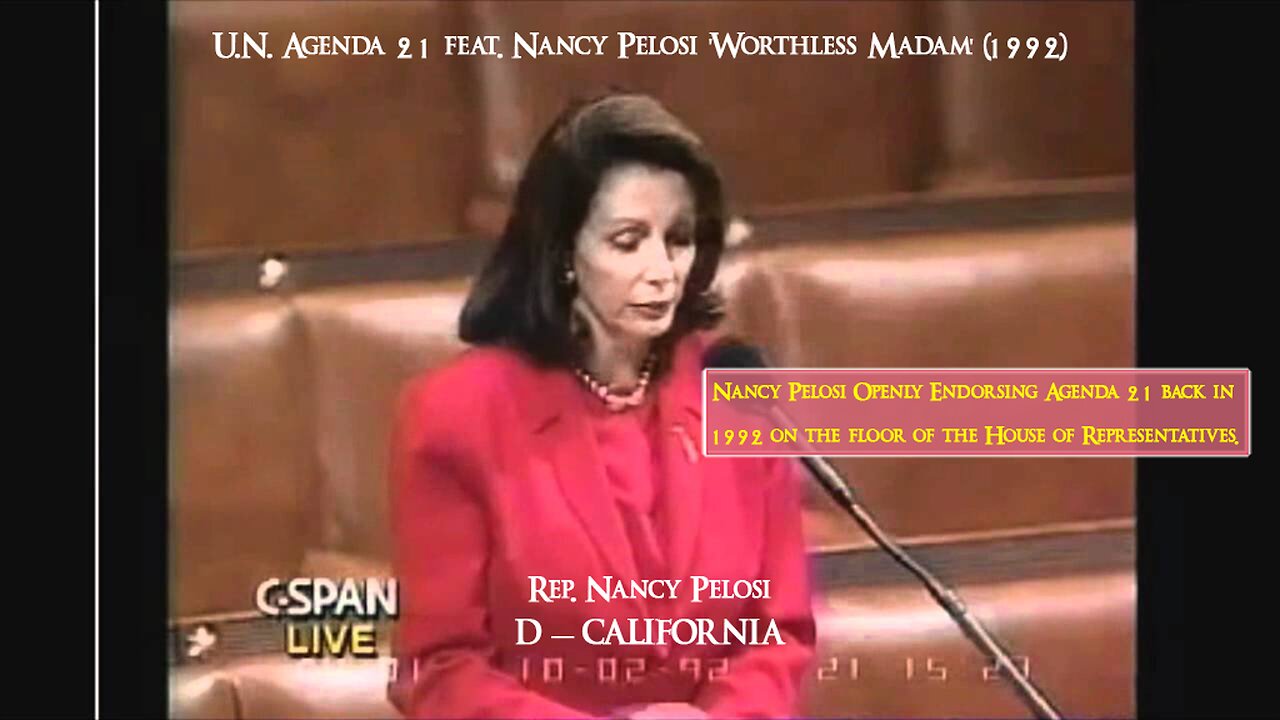Premium Only Content

Earth Summit Environmental Leadership Act - Introduced in House (05-13-1992) by Nazi Pelosi
Nancy Pelosi Openly Endorsing Agenda 21 back in 1992 on the floor of the House of Representatives
Rep. in video is Pelosi, Nancy [D-CA-5] 06/25/1992
BILL TEXT: https://www.congress.gov/bill/102nd-congress/house-bill/5162?s=1&r=12
--
Introduced in House (05/13/1992)
Earth Summit Leadership Act of 1992 - Title I: Foundation for Sustainable Development - Establishes the Foundation for Sustainable Development to: (1) encourage the growth of development institutions indigenous to developing countries which respond to the needs of the poor and promote environmental protection and conservation of natural resources; (2) support efforts to increase the productivity of the poor; (3) support self-help activities at the local level to enlarge opportunities for community development; (4) support efforts at community-based, environmentally sustainable management of natural resources; (5) stimulate and assist the process of people participating in the processes that affect their lives; (6) replicate successful projects promoting sustainable and equitable development funded by specified foundations; and (7) disseminate insights gained in the Foundation's work to the American public and citizens in developing countries.
Authorizes the Foundation to provide grant assistance to indigenous organizations in developing countries or entities working in partnership with such organizations to carry out it purposes. Limits the total amount of assistance for a single project.
Authorizes appropriations.
Title II: Regional Development Foundations - Amends the Foreign Assistance Act of 1969 to increase the authorization amount for the Inter-American Foundation for FY 1993 and to authorize appropriations for FY 1994.
Amends the African Development Foundation Act to authorize appropriations for the African Development Foundation for FY 1993 and 1994.
Makes available an additional amount of economic support fund assistance under the Foreign Assistance Act of 1961 for Appropriate Technology International to enable it to emphasize large-scale replication of successful projects and partnerships with major development and financial institutions.
Title III: Reduction in International Security Assistance - Places a ceiling on the total amount of international security assistance provided by the United States for FY 1993 and 1994.
Expresses the sense of the Congress that international security assistance for FY 1995 and 1996 should be further reduced to promote global demilitarization and make available additional resources for sustainable development programs.
Title IV: Multilateral Organizations - Requires the Secretary of the Treasury to instruct the U.S. executive directors of specified multilateral development banks to promote the following actions: (1) to make available to the public information on physical, institutional, and economic details and the environmental, public health, and sociocultural impacts of proposed bank operations; (2) to ensure that poverty reduction becomes a higher priority, including increases for lending for health care and basic education to at least five percent of the bank's lending; (3) to ensure that all structural adjustment loans after July 1993 are presented with documentation on how such loans will affect incomes of the poor, the diversification of industrial and agricultural production, the delivery to low-income people of essential social and technical services, and the integrity of the natural resource base; (4) to ensure the development of sustainable energy systems by ensuring that all energy sector loans are based on end-use efficiency and renewable energy applications; (5) to establish a comprehensive water resource policy that will require a least-cost approach to planning for and investing in water resource development projects; and (6) to purchase commercial debt obligations of developing countries on the secondary market and forgive those debts in return for adoption of sustainable development policies.
Expresses the sense of the Congress that the President should follow up U.S. participation in the United Nations Conference on Environment and Development (UNCED) by taking an active role during the General Assembly session to ensure full implementation of UNCED recommendations on institutional reform issues.
Title V: Domestic Environmental Policies - Expresses the sense of the Congress that: (1) all budgetary subsidies and tax advantages for unsustainable exploitation of natural resources should be eliminated as long as adequate provision is made to retrain displaced individuals and to assist poor people who are least able to bear the cost implied by such eliminations; (2) the director of the Office of Management and Budget should identify all current budgetary subsidies and tax advantages for the exploitation of nonrenewable energy, forest, and water resources and should estimate their cost to taxpayers as the basis for future congressional action to eliminate them; and (3) each Federal agency should conduct a survey of cost-effective renewable energy technologies which it could adopt for the conduct of its work and should begin conversion to those technologies as soon as possible.
Directs the President to: (1) design a plan for reducing, by 2005, U.S. emissions of carbon dioxide to a level no greater than 80 percent of the 1990 level; and (2) formulate a national strategy for sustainable development.
-
 19:51
19:51
RedPillinfowar
3 months agoSecrets Of The Smithsonian: Humanity's Hidden History | Jay Myers
82 -
 LIVE
LIVE
StormShadow127
3 hours agoPGA Tour 2K23 Leveling Up and Learning Greens.
107 watching -
 1:07
1:07
tether
1 day agoMore than a Stablecoin
10K2 -
 1:19:29
1:19:29
Russell Brand
3 hours agoThe Oracle Series: Trump, Globalism, and the New Spiritual Battle – SF525
88.4K69 -
 1:55:44
1:55:44
The Charlie Kirk Show
2 hours agoThree Days Into the Golden Age + Farewell To the Biden Crime Family | Smith, Kassam | 1.23.2025
106K35 -
 LIVE
LIVE
SternAmerican
23 hours agoIntegrity in Action call With Steve Stern and Raj Doraisamy Thursday, January 23rd 1:50 PM EST
169 watching -
 1:01:15
1:01:15
The Dan Bongino Show
5 hours agoFreedom Is Winning, And The Libs Are Pulling Their Hair Out (Ep. 2407) - 01/23/2025
659K1.44K -
 1:02:52
1:02:52
The Rubin Report
4 hours agoChilling Video from World Economic Forum Head Makes His 2025 Plans Clear
78.5K88 -
 2:15:01
2:15:01
Steven Crowder
5 hours agoHow Trump's Deportation Plan will Save America... And Europe
373K232 -
 1:03:18
1:03:18
Grant Stinchfield
2 hours ago $3.77 earnedThe Mass Deportation Plan is NOW Underway!
40.9K7